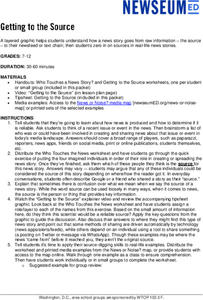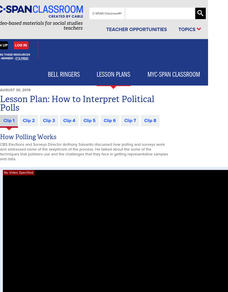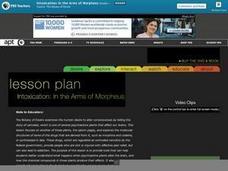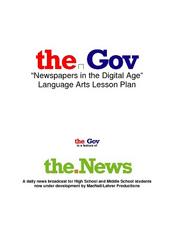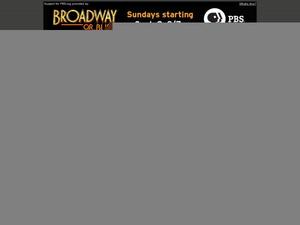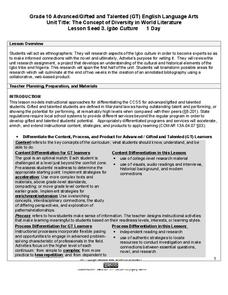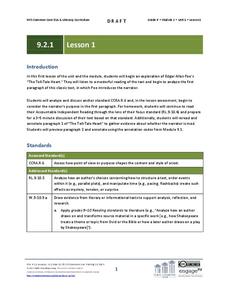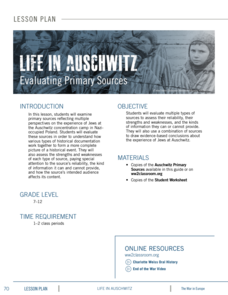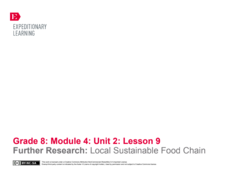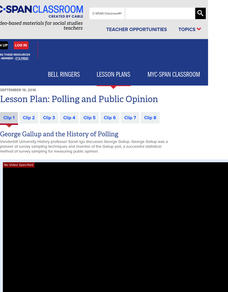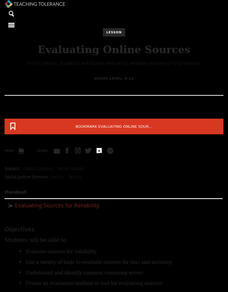Curated OER
Statistical Accuracy and Reliability
Ninth graders assess the accuracy and reliability of current survey data and how it is represented. They design a survey, collect data, and use technology to analyze the data and present the results. Students examine scatter plots and...
Newseum
Getting to the Source
Reliable news stories are based on facts from reliable sources. Young journalists learn how to evaluate the reliability of news sources by watching a short explainer video. Teams apply their new source-digging skills to a current news...
C-SPAN
How to Interpret Political Polls
While numbers don't lie, the reliability of information in a poll may be difficult to discern. After viewing video clips with polling experts, young scholars consider how polls work and the elements of a reliable poll. Extension...
Nemours KidsHealth
Media Literacy and Health: Grades 9-12
An essential skill for 21st-century learners is to know how to find reliable sources of information. Two activities help high schoolers learn how to determine the reliability of health-related news from websites, TV, magazines, or...
Curated OER
The Parachute
Students discuss parachutes and write a procedure to determine the effect of different size parachutes and different masses on the time it takes the masses to fall. They record all their data from their experiment then write three...
Curated OER
Intoxication: In the Arms of Morpheus
A comprehensive lesson that takes a look at psychoactive plants with this one focusing on the opium poppy. Information about the history, culture, use, source and effects are discussed. There are weblinks to reliable sources about drugs...
Curated OER
Understanding and Using Primary and Secondary Sources in History
Explore primary and secondary sources in this historical analysis lesson. Young researchers define the terms primary source and secondary source. They read a primary source document provided by the teacher and answer questions about the...
Curated OER
Newspapers in the Digital Age
Is journalism more or less reliable with the influx of Internet sources? Learners investigate the issues of freedom of speech, journalistic ethics, and social responsibility in the age of Twitter and Facebook. After examining the...
Curated OER
Armadillo: Reporting on War
Point of view is everything, especially when reporting about the war in Afghanistan. Class members compare and contrast the same event from the war in Afghanistan as reported by five different sources. Learners are also asked to rank the...
Baylor College
HIV/AIDS in the United States
In the final of five lessons about HIV/AIDS, groups create presentations to share data about the infection rates in the United States, examining demographic and geographic trends over the past ten years. Depending on how much time you...
University of Wisconsin
Designing a Rain Garden
Now it's time for all of the data collected in previous lessons to be applied to the design of a rain garden. This resource can only be used as part of the greater whole, since learners will need to rely on gathered knowledge in order to...
University of Washington
Connecting Youth to Quality Health Information
Many teenagers don't have adequate access to health and nutrition information beyond a quick Internet search. Guide them into health advocacy and proficiency with a lesson focused on MedlinePlus as a reliable source for health...
Maryland Department of Education
The Concept of Diversity in World Literature Lesson 3: Igbo Culture
What cultural concepts must readers understand in order to connect to Things Fall Apart? As part of their study of Chinua Achebe’s novel, class members research Nigeria and the Igbo culture to create a collaborative, web-based, annotated...
EngageNY
Grade 9 ELA Module 2: Unit 1, Lesson 1
Once conceived, a guided set of literary analysis lessons will assist you day and night. Ninth graders look closely at "The Tell-Tale Heart" and analyze how Poe uses point of view to create questions about the narrator's sanity and...
Curriculum Development Institute
Impact of Cultural Revolution
What is the role of primary and secondary sources in the study of history? How reliable are these different sources? As part of a study of the Chinese Cultural Revolution, class members examine a variety of resources and evaluate their...
National WWII Museum
Life in Auschwitz: Evaluating Primary Sources
Historians explain what happened during the Holocaust, but only primary sources portray the true horror of places such as Auschwitz. Using accounts from those who survived the camps, as well as a Nazi government official's memoirs, class...
Stanford University
Great Plains Homesteaders
"Westward, ho!" may have been their cry in spite of the hardships. Using a series of photographs by Solomon D. Butcher of those who ventured west, class members consider what life was like in the 1800s for those who embarked on the...
Stanford University
The Gold Rush and San Francisco
The California Gold Rush rewrote the history of the American West, but especially that of San Francisco. After analyzing images of the city and primary sources, such as a diary entry, scholars discuss these changes. Scaffolded questions...
EngageNY
Further Research: Local Sustainable Food Chain
Researchers review how to create citations, find reliable sources, and paraphrase. Next, using guided task cards and their researcher's notebooks, they investigate the question they developed in instructional activity eight about the...
C-SPAN
Polling and Public Opinion
Polls are ubiquitous in American politics, but just how reliable and equal are they? A video-driven resource helps learners discuss the question by examining what pollsters and pundits say. Extension activities involve evaluating the...
EngageNY
Gathering Information about Water Management: Assessing and Reading Internet Sources, Day 2
Accuracy, credibility, timeliness ... it's time to act on source reliability! Pupils continue conducting Internet research, selecting two questions about water management from their researcher's notebooks that they want to explore...
Teaching Tolerance
Understanding and Evaluating Online Searches
With billions of options to choose from, how can people determine which online sources are reliable? Using an informative resource, pupils first discuss and evaluate a sample search result handout. Next, partners create a checklist for...
Teaching Tolerance
Evaluating Online Sources
Newspapers, television, social media ... how do people get their news? Using the informative resource, scholars locate and verify credible sources of information. Working in small groups, they discuss strategies for evaluating the...
US House of Representatives
House History Comes Alive
New ReviewHow reliable is oral history? The resource uses the oral history website to help academics understand the pros and cons of using recollections to teach others. Scholars complete a worksheet, draft a letter to a representative, and...
Other popular searches
- Validity and Reliability
- Data Reliability
- Internet Reliability
- Teaching Website Reliability
- Reliability of Sources
- Source Reliability
- Resource Reliability
- Reliability and Objectivity
- Reliability in Practicals
- Research Reliability
- Reliability of Texts
- News Reliability



